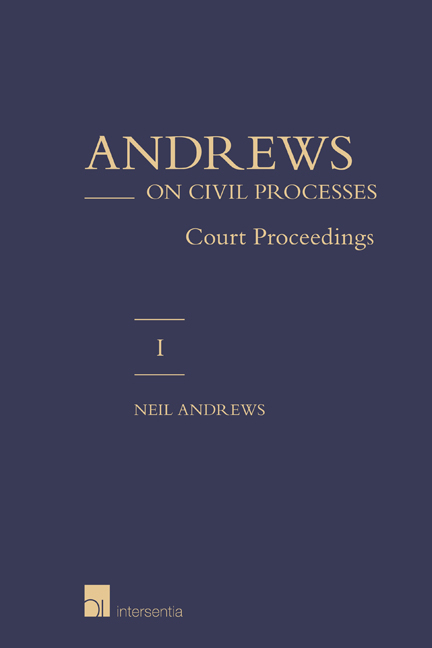Book contents
- Frontmatter
- Dedication
- Epigraph
- Preface
- Contents
- Table of Cases
- Table of Statutes
- Table of Statutory Instruments
- PART I INTRODUCTION TO THE FORMS OF CIVIL JUSTICE
- PART II COMMENCEMENT OF COURT PROCEEDINGS AND PREPARATION FOR TRIAL
- PART III END-GAME: TRIAL, APPEAL, FINALITY AND ENFORCEMENT
- Chapter 14 Trial and Judgment
- Chapter 15 Appeals
- Chapter 16 Finality in Court Proceedings
- Chapter 17 Enforcement of Court Judgments and Orders
- PART IV COSTS AND FINANCING OF LITIGATION
- PART V SPECIAL PROCEEDINGS
- PART VI PRINCIPLES OF CIVIL LITIGATION
- PART VII THE EUROPEAN CONTEXT
- Select Bibliography
- Index to Volumes I and II
Chapter 15 - Appeals
from PART III - END-GAME: TRIAL, APPEAL, FINALITY AND ENFORCEMENT
Published online by Cambridge University Press: 13 December 2017
- Frontmatter
- Dedication
- Epigraph
- Preface
- Contents
- Table of Cases
- Table of Statutes
- Table of Statutory Instruments
- PART I INTRODUCTION TO THE FORMS OF CIVIL JUSTICE
- PART II COMMENCEMENT OF COURT PROCEEDINGS AND PREPARATION FOR TRIAL
- PART III END-GAME: TRIAL, APPEAL, FINALITY AND ENFORCEMENT
- Chapter 14 Trial and Judgment
- Chapter 15 Appeals
- Chapter 16 Finality in Court Proceedings
- Chapter 17 Enforcement of Court Judgments and Orders
- PART IV COSTS AND FINANCING OF LITIGATION
- PART V SPECIAL PROCEEDINGS
- PART VI PRINCIPLES OF CIVIL LITIGATION
- PART VII THE EUROPEAN CONTEXT
- Select Bibliography
- Index to Volumes I and II
Summary
INTRODUCTION
A system of civil appeals has five main functions and just ifiations: (i) correcting wrong decisions; (ii) maintaining the faith of the public in the judicial system; (iii) keeping trial judges up to scratch; (iv) enabling teams of senior judges to develop and ref ne judicial doctrine; (v) promoting a unified and consistent application of the law. And there is a further argument: providing an incentive to lower-tier judges to progress up the judicial ladder. These points will be developed now.
First, recourse to appeal enables an aggrieved litigant to rectify a perceived judicial error, of law or fact. Machinery for appeals from decisions is an official acknowledgement of judicial fallibility. A court will allow an appeal when it concludes that the lower court's decision was ‘wrong’ or ‘unjust because of a serious procedural or other irregularity in the proceedings in the lower court’. On matters of law, appellate courts are fully prepared, indeed obliged, to make corrections. However, in general, the courts are most reluctant to hear appeals on ‘academic’ or ‘hypothetical’ points, namely matters which are of no immediate and direct concern to the parties. But an exception to this can arise if the point of law is of general public importance.
Secondly, the system of civil appeals also promotes the public interest in correcting judicial mistakes since such errors might otherwise undermine public faith in the administration of justice.
Thirdly, the potential scrutiny on appeal keeps trial judges up to scratch by exposing their decisions to rigorous scrutiny. The author is aware of the horror experienced by some first instance judges, ambitious to be promoted to the Court of Appeal, who feel that their decisions have been unjustifiably reversed by the appeal court. In one instance, the overturned judge later sought to repudiate the authority of the appellate court (but this is an unusual response).
Fourthly, the appellate system enables senior and experienced judges, working as a team rather than isolated trial judges, to develop and refi ne legal doctrine. The ‘team’ here (for details, 29.10) refers to the panels of Lords Justices of Appeal in the Court of Appeal.
- Type
- Chapter
- Information
- Andrews on Civil ProcessesCourt Proceedings, pp. 415 - 460Publisher: IntersentiaPrint publication year: 2013
- 1
- Cited by

